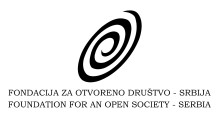29. 05. 2012
THIRTY-SECOND MONITORING REPORT
According to the findings of the monitoring team, in April 2012, the media scene in Serbia looked like this:
Freedom of expression - Election process in Serbia has negatively affected the respect for media freedom and freedom of expression, as regarded by the monitoring team. Starting from the statement of the Delegation of the CoE's Parliamentary Assembly and Bureau for Social Research's report on the monitoring of the media reporting in electoral campaign, authors analyze the media situation in this period, the problems faced by journalists and the media, their causes and ill-effects on freedom of expression. Of two analyzed court proceedings, the authors of the Report particularly emphasize the importance of the one in which the Belgrade Court of Appeals' ruling brings practice of Serbian courts in media cases closer to the highest European standards.
The implementation of existing laws - Implementation of the Broadcasting Law is observed through the General Binding Instruction to broadcasters, adopted by the RRA to facilitate the unhindered informing of viewers with hearing impairment during the 2012 election campaign. What obligations for broadcasters do this Instruction stipulates, what is the legal basis for these obligations and for the Instruction itself, to what extent this Instruction facilitates protection of the right to freedom of expression of citizens with impaired hearing - these are some of the questions that the monitoring team has dealt with in the Report. The authors also deal with the Law on Personal Data Protection, namely statement of the Commissioner Sabic, in which he warned the Ministry of Interior of illegal processing of personal data in certain activities of the said ministry. This is of particular importance for the media as they were often exposed to lawsuits and convicting verdicts due to the publication of police reports and video footage of arrested persons, accompanied by texts revealing the identity of such persons, which, in the opinion of the courts, violated privacy and presumption of innocence.
In this period, the Serbian Parliament held no sessions and therefore, no new legislation were adopted, including those that would be of importance for the media.
The work of the authorities - in this period, the Republic Broadcasting Agency (RBA) was very involved in supervision of the work of electronic media in the election campaign. Authors of the Report analyze the extent to which the RBA has been successful in this task and the importance of the general supervision of the electoral process. The authors analyze problems with cable distributors and obligations of operators with major strength in the media content distribution market, a propos the decision of the Serbian Agency for Electronic Communications (RATEL) to allow SBB the service price modification. Dealing with the activities of the Press Council, the authors analyze the adoption of a positive decision on the appeal of a violation of the Serbian Journalists' Code, as well as the case of the absence of any decision in other proceeding where the Commission for Complaints has failed to decide whether the Code was violated or not. Signing of the contract between the Parliament and RTS on the live coverage of the new Assembly's sessions, as well as SOKOJ's tariff for broadcasters, have also been addressed in this part of the Report.
The authors of the Report deal with new developments in the field of digitalization in this period - the formation of several different content packages in the Initial network and expanding of the list of broadcasters, whose programs meet the requirements for entry into individual packages.
Privatization of media - By analyzing several cases in this period, the authors point to the fact that, instead of going towards the withdrawal of the state from media ownership, as foreseen by the Media Strategy, the processes in Serbia are moving in the opposite direction.
In the Conclusion of the Report the authors explain what makes the picture of media environment so grim in this period, as well as what is a step forward and why.
The Thirty-second Monitoring Report was done by the expert team of the law office "Zivkovic&Samardzic", in cooperation with ANEM. Here you can download the Report, in whole or in part, by clicking on the selected section below.

Section FREEDOM OF EXPRESSION here
Section MONITORING OF THE IMPLEMENTATION OF EXISTING REGULATIONS here
Section MONITORING OF ADOPTION OF NEW LAWS here
Section MONITORING OF THE ACTIVITIES OF REGULATORY BODIES, AUTHORITIES AND COLLECTIVE ORGANIZATIONS here
Section MONITORING OF THE DIGITALIZATION PROCESS here
Section MONITORING OF THE PRIVATIZATION PROCESS here
Section OVERALL CONCLUSION here
The COMPLETE REPORT can be downloaded here
-
No comments on this topic.





